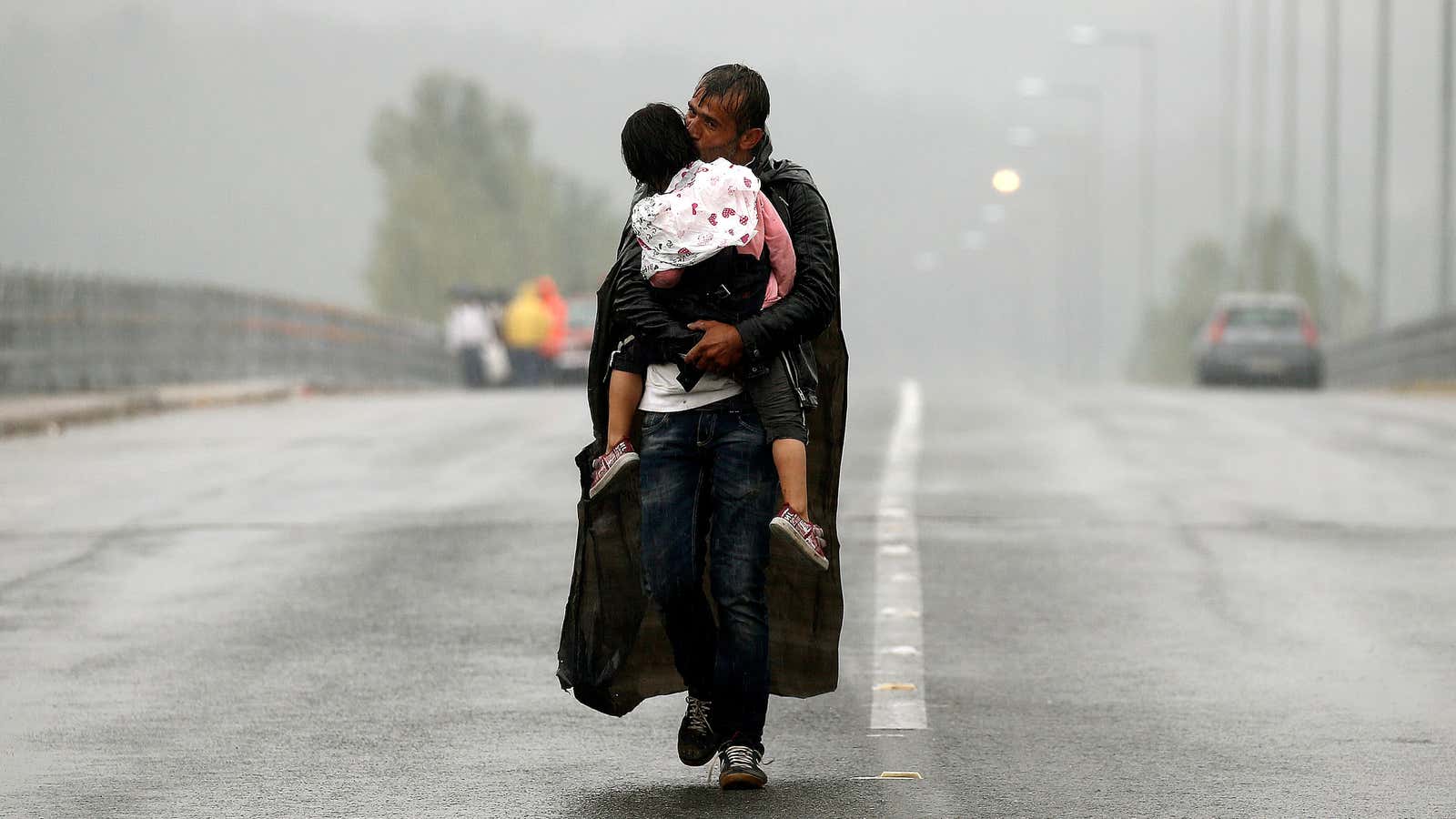In recent weeks, there has been much discussion about distinguishing between migrants and refugees. Images of thousands of people fleeing their homes, some dying in the process, have made the debate over terminology more prominent than ever before.
Last month, Al Jazeera said it would no longer use the word “migrant,” a word that it described as stripping “suffering people of voice.” Many are calling on other media organizations to make a similar change. While highlighting the dire conditions facing those seeking safety outside their home countries, switching from “migrant” to “refugee” in reporting is simply not enough. In fact, it may do more harm than good.
The murky distinction between “refugees” and “migrants”
According to prevailing logic, because most individuals entering Europe irregularly are fleeing war-torn regions, they are refugees, not migrants, and should be referred to as such. From a legal perspective, the difference between the two terms is indeed enormous. When someone is given refugee status, he or she is entitled, under international law, to remain in their country of asylum. Migrants, on the other hand, enjoy no such protections and can be deported at will.
At first glance, this may seem like a reasonable distinction—refugees are, after all, forced to leave their home countries, while migrants have chosen to move. Because of a number of factors, however, this distinction is often not so clear.
First, the UN parameters defining refugee status are outdated and narrow, a reflection of the post-World War II European environment from which they emerged. According to the UN regulations, only those fleeing persecution or war qualify as refugees. Those escaping their home countries because of famine, poverty, or climate change do not qualify as refugees under international law. Despite experiencing similar conditions to those fleeing political persecution or war, these individuals are classified as “migrants.”
Second, individuals who are fleeing danger or persecution are unable to obtain refugee status if they do not have the necessary documentation. This includes the family of Aylan Kurdi, the three-year old boy whose body washed up on Turkey’s shores and who has since become an icon for the current crisis.
The Kurdi family is by no means an exception to the rule. Offices for the United Nations High Commissioner for Refugees (UNHCR) in Lebanon, Turkey, and Jordan—the three countries where the vast majority of displaced Syrians have found themselves—are overburdened and understaffed. Estimates for processing times at these offices are increasingly long. While waiting for the UNHCR to rule on their petitions, displaced Syrians face terrible living conditions and little, if any, legal protections. Together, these circumstances are leading many to look for other options—such as boarding boats to Europe.
Third, refugees today continue to depend on the generosity of national governments. Under the prevailing model for voluntary refugee resettlement, states can choose to accept—or not accept—a certain number of refugees. Even when grand commitments are made, states continue to maintain barriers to entry, such as additional screening and documentation requirements, which result in further delays. Many Syrians are, for example, denied resettlement for allegedly posing a “security risk,” a broad term that includes those who have defected from the Syrian army or have worked with opposition groups. The term is so vague it can even include selling falafel to a rebel fighter. The broad nature of this ground for exclusion leaves few untouched.
Against this backdrop, it is unsurprising that, as reported by The Guardian, only 62% of the nearly 200,000 people who have arrived in Europe are officially classified as refugees. This means over one third of those arriving by boat are not refugees. Though these individuals may also be fleeing war and poverty, they have been cast under the general label of “migrant.”
Fixing the problem
Simply referring to the current situation as a refugee instead of a migrant crisis does little to help these individuals. If anything, it actually reinforces a broken international protection system, which excludes many well-deserving individuals. Migrants who “choose” to undertake a heart-wrenchingly difficult journey because all other, safer avenues are closed are no less deserving of human rights or protections than “refugees.”
The current crisis in the Mediterranean brings to the fore the shortcomings of existing refugee law. Conflict and poverty are often interrelated, and this should be reflected in the international protection regime. Instead of focusing on journalistic representations, those seeking to enact meaningful change should focus on the larger picture and advocate that more migrants qualify as refugees. The legal definition of refugee should be expanded to include those fleeing their home countries due to famine, poverty, climate change, or generalized violence. This broadened definition would help safeguard the basic rights of those who would otherwise be deemed “migrants” and protect them from deportation. The burden of proof on refugees to provide documentation of their plight should also be reduced.
In addition to expanding this definition, and regardless of an individual’s legal status, it is also crucial that governments guarantee basic human rights protections for all migrants by ensuring that they are not detained on arrival and do not face brutal policing practices, Finally, governments should ensure that migration routes are not deliberately made more dangerous and difficult by outsourcing policing and border management to neighboring countries.
At the end of the day, it matters less whether a news organization describes people fleeing their homes as refugees or migrants. What matters far more are the legal protections guaranteed to all—migrants or refugees—as they move across international borders.
